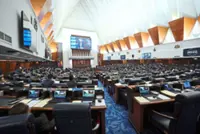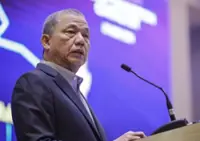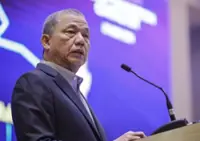JOHOR BARU: About one year ago, a grandmother received an unexpected visit from a stranger.
Dayang Noor, 62, was then struggling to care for nine grandchildren, all on her own.
But James Ho, the founder of a non-governmental organisation, stepped in to help.
“It was heartwarming to see a stranger putting in so much effort to help me, even though we are from different races.
“Until today, he has been helping me with my rent through his NGO besides providing me with groceries every two weeks,” she said.
Ever since then, she has also received help from others, including people from all walks of life.
Dayang’s story of a beautiful Malaysia is also reflected in the various ‘Harmony Streets’ throughout the country, such as in Johor, Penang, Melaka and Kuala Lumpur.
In Johor Baru, Coronation Avenue is the site of several mosques, a church, a gurdwara, a Hindu temple and a Chinese temple.
Their close proximity is not a coincidence but a legacy of land grants made by Almarhum Sultan Sir Ibrahim Ibni Almarhum Sultan Abu Bakar, more than 100 years ago.
Community leader V. Raja Selan said the street’s history dates back to the 19th century when the late Sultan Ibrahim granted land to different religious communities.
“He knew harmony was important, and he made it happen,” he said.
Raja Selan said the concept of cooperation has been maintained through the generations.
“Whenever there is a festival or procession, we inform the other religious groups in advance. It has always been mutual.
“When people of different faiths are your neighbours, you learn to understand and respect each other,” he said.
Johor Baru Tiong-Hua Association president Ho Sow Tong said the street is a good example of unity among Malaysians.
“It shows that unity is not something we just talk about; it is something we have lived with for over a century. These concepts have been around for generations, and that says a lot,” he said.
Malaysian Tourist Guides Council president Jimmy Leong said the area, commonly known as the Johor Baru central business district, has become increasingly popular, even among foreigners.
“It is not something you see often – a church, temple, mosque and gurdwara all within walking distance,” he said.
In George Town, Jalan Masjid Kapitan Keling is a shared space among various religious communities.
Civil society activist Datuk Seri Anwar Fazal said the colonial government had allocated the plots to different religious groups.
“Today, the street is home to St George’s Church, the Kapitan Keling Mosque, the Goddess of Mercy Temple (Kuan Yin Temple) and the Sri Mahamariamman Temple,” he said.
Surrounded by vibrant enclaves, such as Little India, Chinatown, Kampung Melayu, and the Acheen Street Malay community, Jalan Masjid Kapitan Keling has evolved into a meeting point for people of different backgrounds.
He said over the centuries, the street has remained a symbol of religious tolerance and multicultural unity, where festivals of various faiths continue to take place within close proximity.
Anwar, who is also Dr Wu Lien-Teh Society president in Penang, said he had the honour of taking then-Indian president Dr A.P.J. Abdul Kalam on a walk along ‘Harmony Street’ when he visited Penang in 2008.
Inspired by what he experienced, Dr Abdul Kalam wrote a poem titled The Great City of Harmony, describing Penang as “a school for harmony, learning for the whole of humanity.”
There are four such streets in Penang currently.
They are in the Kapitan Keling Mosque area in George Town, Seberang Jaya, Bukit Mertajam, and Bayan Baru.
Brickfields, Kuala Lumpur, is home to the Sam Kow temple, Madrasatul Gouthiyyah, the Tamil Methodist Church, the Sri Sakthi Karpaga Vinayagar temple, the Evangelical Lutheran Church and the Buddhist Maha Vihara.
Women’s rights advocate Ivy Josiah recalled her childhood days there.
“I grew up in Brickfields, where the sounds of church bells, Buddhist chants, the call to prayer, and temple bells blended seamlessly every day.
“We shared meals in each other’s homes, supported one another in times of joy and sorrow – whether at weddings or funerals,” she said.
Ivy stressed the importance of Malaysians not taking anything for granted and resisting attempts to divide the society.
Initiative to Promote Tolerance and Prevent Violence’s (Initiate.My) founder, Aizat Shamsuddin, said that Malaysia has been shaped socially, economically and politically by various communities.
“Our ability to coexist and stay motivated in building this country together is one of our greatest strengths,” he said.
Aizat also said that the task of promoting harmony isn’t just the job of the government or law enforcement.
“It’s a collective responsibility,” he said.
National Unity Advisory Council member Tan Sri Lee Lam Thye said it is important for the National Unity Ministry to take the lead in efforts to unite Malaysians, and it must be supported by other ministries and agencies as well.
“This requires a whole-of-government approach,” he said.
Lawyer Ivanpal Singh Grewal said the houses of worship in Brickfields proved that diversity strengthens Malaysia, offering a model of harmony in a divided world.
However, maintaining harmony requires educating youths about diversity, encouraging open dialogue and leading by example, he added.





